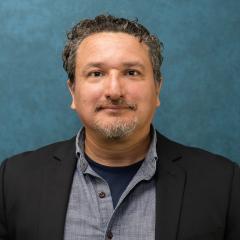We are thrilled to host Dr. Roberto Barrios, an expert in disaster anthropology, for two compelling talks at UBC that delve into the complex intersections of crisis, migration, solidarity, and resilience. Drawing on his extensive research across Latin America and the United States, Dr. Barrios will offer thought-provoking insights into how disasters reveal hidden social structures and how marginalized communities navigate their aftermath.
In the first talk, Dr. Barrios explores the COVID-19 pandemic through the lens of disaster social science, examining how crises can expose societal fault lines and challenge Eurocentric ideas of transformation and change. The second talk focuses on post-Katrina New Orleans, where he traces the struggles and resilience of Central American migrants who played a key role in the city's recovery, only to become disaster survivors themselves. Together, these talks invite us to rethink crisis, solidarity, and the possibilities for transformative social change in a world increasingly shaped by transnational risks.
These talks are being hosted by DRRN and the UBC Department of Anthropology in collaboration with the Centre for Climate Justice, Public Humanities Hub, the Department of Civil Engineering, and the School of Public Policy & Global Affairs.
Light refreshments will be provided. Please RSVP for each talk using the links below.
1) A Revelatory Pandemic? COVID-19 and Disaster Social Science
Time & Location:
Thursday, Oct 3, 2024 | 12:30pm-2:00pm
6303 NW Marine Drive, Anthropology & Sociology Building (ANSO), Room 207
Abstract:
Since the mid 20th Century, cultural anthropologists have thought of crises as methodologically opportune moments that allow social scientists to see social structures and fault lines that are much harder to document in times of “normalcy.” Others have connected the idea of the revelatory crisis to older Eurocentric meanings of crisis as a moment full of potential for social transformation that separates neatly defined epochs. During the onset of the COVID 19 pandemic public scholars and social commentators referenced the idea of crisis as a revelatory event pregnant with transformative potential to imagine the global health disaster as a moment of reckoning that could mark the end of neoliberalism. But anthropological treatment of crisis as a revelatory event has fallen short of considering the epistemological diversity of the beholders of crises and has also verged on theorizing the relationship between crisis and change as a purely mechanical one that all but removes human agency from the process.
Using ten pandemic case studies from across Latin America, this presentation explores how a focus on crisis in the Global South stands to correct the temporal and historiographic Eurocentrisms of crisis theory and beckons us to re-imagine the relationship between crisis, subjectivity, agency, and transformative social change.
2) Reimagining solidarity and resilience in a disastrous world: the migrante struggle for belonging in post-Katrina New Orleans
Time & Location:
Thursday, Oct 3, 2024 | 5:30pm-7:00pm
1855 West Mall, CK Choi Building, Room 120
Abstract:
Nearly fifty years ago, Ulrich Beck challenged the public at large to imagine new kinds of solidarity that cut across lines of class and nation in the face of risks engendered by modernization and “development,” especially considering the capacity of emerging risks to move across national borders, bringing a new level of complication to matters of environmental justice. At the end of the first quarter of the 21st Century, Central America is the subtropical area expected to be most affected by the effects of anthropogenic climate change, a transnational risk largely engendered by the Global North. In the last quarter century, drought, hurricanes, and floods have joined profound socio-economic inequities dating to the colonial period, post-colonial political culture, alliances between national elites and the US State Department, the long term impacts of Cold War civil conflicts and military interventions, and structural adjustment and neoliberal models as the root causes of informal migration from Central America to the United States. When Hurricane Katrina struck New Orleans in 2005, the US State Department lifted labor restrictions barring reconstruction contractors from hiring informal migrants – most of them Central American – and it is estimated they comprised at least 35% of the recovery labor force. Nearly twenty years later, many of these post-Katrina reconstruction workers have made the Greater New Orleans area their home but many have not been able to formalize their immigration status. To further complicate things, they have also experienced a transition from recovery workforce to disaster survivors themselves as New Orleans continues to confront hurricanes and the COVID 19 pandemic.
This presentation explores the challenges, struggles, and victories of informal migrants as they attempt to assert their rights and make New Orleans their home despite growing anti-immigrant sentiment. The presentation explores the discursive and direct-action strategies employed by migrantes – as they often call themselves – and their efficacy for defining a place for themselves and, in the process, redefining the social fault lines of solidarity in a world of increasingly transnational disaster risks and migration forces. The presentation also considers how such efforts connect with critical understandings of resilience and how affective themes intersect with migrante challenges to state-defined categories of national belonging and rights claims, urging the US public to imagine new forms of citizenship.
Photo by Lindsey Flynn on Pexels

